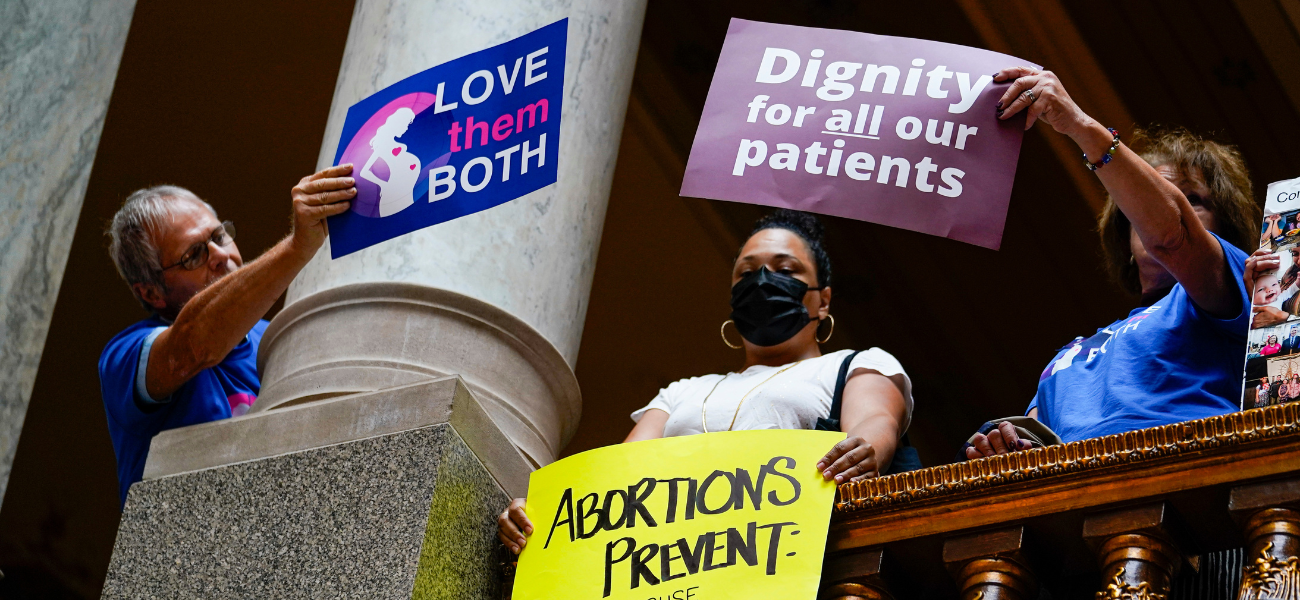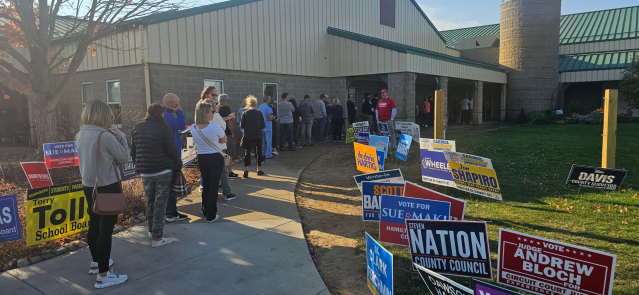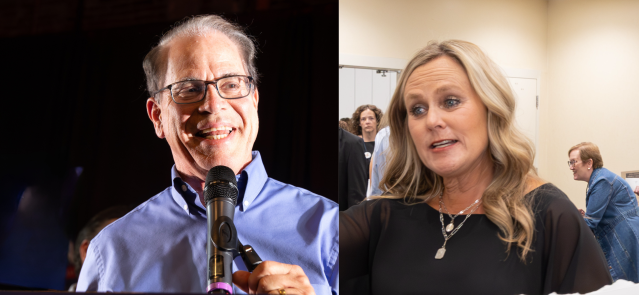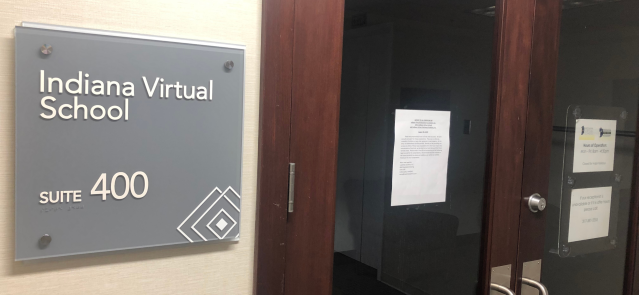Stay ahead of the curve as a political insider with deep policy analysis, daily briefings and policy-shaping tools.
Request a DemoJudge turns down bid to broaden abortion ban exceptions

Anti-abortion supporters try to cover up the sign of an abortion rights supporter during an anti-abortion rally at the Indiana Statehouse on July 26, 2022. (Credit: AP Photo/Michael Conroy)
The Gist
A county judge has rejected arguments that the health exceptions to Indiana’s near-total abortion ban are too narrow to comply with the state constitution.
Owen County Judge Kelsey Hanlon released a decision Wednesday denying a request from abortion providers for an order expanding those health exceptions and lifting the state’s ban on abortion clinic licenses.
An appeal of the decision to higher courts is likely, but a Planned Parenthood spokeswoman told State Affairs that legal options were still being evaluated.
What’s Happening
The Indiana Supreme Court allowed the abortion ban law — adopted in 2022 as Senate Bill 1 — to take effect last year but left unresolved how broad the health exceptions needed to be under the state constitution.
An attorney representing Planned Parenthood and other abortion providers argued before Halon in May that the law’s provisions allowing abortion to protect the life and health of the mother are unclear and leave doctors uncertain about their actions.
Hanlon, however, ruled that the providers “have not shown that S.B. 1 materially burdens the rights of any specific patient or well-defined class of patients to access constitutionally protect abortion care.”
Hanlon wrote that the ban’s opponents had presented “significant and compelling evidence” regarding the law’s impact on medical professionals but that she couldn’t substitute her policy preferences for those of the General Assembly.
The judge’s decision leaves the current law in place with no modifications.
The ban approved by the Republican-dominated Legislature in 2022 prohibits abortions at any stage, except in cases of rape or incest before 10 weeks postfertilization or to protect the life and health of the mother.
Why It Matters
The abortion providers argued that the ban’s exceptions are too narrow to abide by the state constitution’s Article 1, Section 1 life and liberty protections.
The ban’s opponents wanted the health exceptions broadened to include mental health and numerous health risks that can be exacerbated by pregnancy. They also sought an injunction lifting the ban on abortion clinic licenses, arguing that so few hospitals provide abortions that access is severely limited even in circumstances that meet the law’s exceptions.
Hanlon cited “the legislation’s failure to account for the individual risk tolerance of physicians and patients” in their medical decision under the law, which allows felony criminal charges against a doctor performing an abortion that doesn’t meet the exceptions.
The judge, however, ruled that the Legislature had not overstepped its authority.
“Plaintiffs have not shown an instance where an abortion is necessary [judge’s emphasis] to treat a serious health risk but would also fall outside of the Health and Life Exception,” Hanlon wrote. “Additionally, Plaintiffs have not demonstrated that the Hospital Requirement is materially burdensome to constitutionally protected abortion access.”
Hanlon, who is special judge on the lawsuit filed in a Monroe County court, issued a preliminary injunction in 2022 blocking the abortion ban from taking effect as she ruled it likely violated the state constitution’s privacy protections.
Hanlon’s injunction was later overturned by the Supreme Court with its June 2023 decision.
What’s Next?
It has taken a year or more for various legal challenges to the abortion ban to be taken up and decided by the state Court of Appeals and Supreme Court.
Planned Parenthood, the American Civil Liberties Union of Indiana and other groups fighting the ban didn’t immediately say Wednesday what they would do next, but maintained that Hanlon’s ruling “means that pregnant Hoosiers’ lives will continue to be endangered by Indiana’s abortion ban.”
“Already, Hoosiers with serious health complications have been forced to endure unjustifiable suffering due to miscarriages, ectopic pregnancies, and other pregnancy-related issues or leave the state to access appropriate care,” the groups said in a statement. “We will continue to serve patients as best as possible and work towards a future where patients and their doctors can make decisions without politicians in their exam rooms.”
State Solicitor General James Barta, a top aide to Attorney General Todd Rokita, argued in May that the law allows doctors to apply “reasonable medical judgment” in deciding whether an abortion is necessary.
Rokita said in a statement that the abortion ban law was “reasonable and constitutional” as he cheered Wednesday’s court ruling.
“This is another huge win for life and no matter how many times Planned Parenthood tries to sue and push forward their culture of death, we will continue fighting for mothers, fathers and the unborn,” Rokita said.
Update: This story has been updated with additional details and comments.
Tom Davies is a Statehouse reporter for State Affairs Pro Indiana. Reach him at [email protected] or on X at @TomDaviesIND.
Know the most important news affecting Indiana
Get our free weekly newsletter that covers government, policy and politics that impact your everyday life—in 5 minutes or less.
Latest early voting numbers show possibility of strong turnout
Nearly 1.5 million Hoosiers have already cast their ballots in the general election, according to the latest early voting report from the Indiana Election Division. As of Monday morning, about 1,261,000 people had voted in person using early voting, which began last month. Nearly 180,000 mail-in ballots have been tallied, bringing the overall turnout to …
Braun, McCormick race to sway voters in final days
Another tight race for an open gubernatorial seat finds Republican nominee Mike Braun and his Democratic counterpart, Jennifer McCormick, crisscrossing the state seeking undecided voters the final weekend before Tuesday’s election. Sen. Braun will appear Saturday at Hummel Park in Plainfield at 9:30 a.m., the Vigo County Fairgrounds in Terre Haute at noon, the Knox …
Lawyers drop virtual schools leader accused of vast enrollment fraud
The Indiana online school operator accused of leading a $150 million enrollment fraud scheme faces having no legal representation in the criminal and civil cases against him, leading to questions about whether the state can recover any of that money. Federal and state officials allege the schools led by Thomas Stoughton — Indiana Virtual School …
Early voting numbers suggest strong turnout, but which candidate benefits?
Chris and Shelby Ashby waited about an hour and a half Tuesday morning to vote at St. Luke’s United Methodist Church in Indianapolis, where the line coiled around temporary fences before stretching into the parking lot. The Indianapolis couple’s toddler was in preschool, and they were hoping to avoid the long lines on Election Day. …



